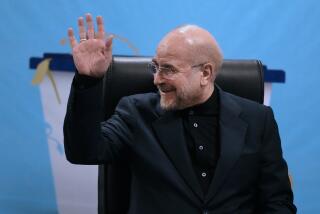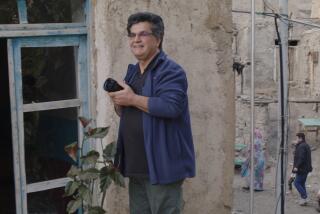An unlikely Iraqi leader emerges
Reporting from Baghdad — Among all the candidates being touted for the prime minister’s job in the next Iraqi government, one stands out for his near-total lack of political experience.
Jaafar Sadr, 40, has spent his entire adult life as a student, in Baghdad, in Najaf, in the Iranian city of Qom, where he pursued religious studies under ayatollahs, and most recently in Beirut, where he is close to earning a bachelor’s degree in sociology and anthropology.
But Sadr’s heritage puts him in the ranks of aristocracy, at least by Iraqi Shiite Muslim standards. He is the only son of the revered Grand Ayatollah Mohammed Baqir Sadr, who was executed by Saddam Hussein in 1980 and whose portrait looms large on billboards in almost every Shiite community across the country. And he is a second cousin and brother-in-law of the radical cleric Muqtada Sadr, who commands a vast following among poor Shiites.
Jaafar Sadr’s pedigree alone was enough to ensure that when he ran from Baghdad on Prime Minister Nouri Maliki’s State of Law list, he received the slate’s most votes after Maliki — albeit with a huge gulf. That secured him a seat in parliament. He also came in second in an advisory referendum Muqtada Sadr supporters held on the prime minister’s post, and he was named one of their two candidates for the job.
Amid the political and judicial bickering surrounding the still-unresolved elections, it is impossible to predict who will head the next government. Secularist Iyad Allawi, whose slate won the most seats though not a majority, is claiming the right, while Maliki is making it clear he intends to fight to keep his position. But many diplomats and analysts suspect the premiership will go to neither man, and that a relative unknown will emerge as a compromise.
Jaafar Sadr is already being widely tipped for that role. His youth and inexperience count against him, but at the same time he has had no chance yet to make enemies, unlike most other politicians.
Opposition to Maliki is the main obstacle to the creation of a grand Shiite coalition that could nix Allawi’s ambitions. If Maliki were forced to stand aside, then Sadr, as a member of Maliki’s slate, “is potentially a really strong contender,” said Marina Ottaway, director of the Middle East program at the Carnegie Endowment for International Peace.
“While he is an obscure figure himself, he comes from a family that is far from obscure,” she said. “He brings the family name with him, and that would give him the support of the mainstream Shiite establishment and also the Sadrists.”
Muqtada Sadr, who withdrew from the political limelight in 2007 and is studying to become an ayatollah, is not considered a contender.
Jaafar Sadr, despite his family legacy, says he is no Islamist, a point he was keen to stress in an interview at his home in the Baghdad neighborhood of Kadhimiya.
Fresh-faced and scholarly in rimless glasses, he shed his cleric’s robes when he ended his religious studies in Iran in 2005. Dressed in beige slacks, blue blazer and striped shirt, he would not seem out of place among the diplomatic community ensconced on the other side of the city in the Green Zone.
Sadr said he joined Maliki’s coalition because he liked its platform of non-sectarianism and emphasis on the rule of law, but he refused to join Maliki’s Islamic Dawa Party, founded by Sadr’s father, because he does not agree with its Islamist ideology.
In fact, Sadr said, years of studying Islam have convinced him that religion and politics don’t mix, and though it was his father who formulated the ideology that shaped the thinking of Iran’s revolutionary leader Ayatollah Ruhollah Khomeini, he does not share his views.
“I think Sayed Mohammed Baqir Sadr, if he was here today, would change his thoughts when faced with the demands of reality,” he said. “It’s not possible to be frozen on thoughts which are considered part of history.”
Rather, Sadr said, he regards himself as a moderate who would like to see the Iraqi state modeled along the lines of the United States or Britain, with their emphasis on individual freedoms and pluralism. Though he spent many years in exile in Iran, he believes Iraq should maintain a “strong, strategic” relationship with America, as well as close ties with Iran.
He also does not share the political views of his cousin Muqtada Sadr, especially on the use of violence to achieve political goals.
Muqtada Sadr, who is married to his sister, is staying at Sadr’s home in Qom while he studies there. They meet regularly in Qom, and they quarreled when Jaafar Sadr chose to join the slate of Muqtada Sadr’s arch-rival Maliki. But they have since reconciled, and the support of his radical cousin’s movement could prove crucial to Jaafar Sadr.
Sadr won’t rate his own chances of securing the position. He says he has not been approached by any political bloc, and has not engaged in any negotiations.
But if the pendulum swings his way, Sadr makes it clear he would be interested in the job.
“I’ve got a vision for the country and I’m ready to achieve it,” he said. “I will not hesitate to perform any service that would set our country in the right direction.”
Times staff writer Raheem Salman contributed to this report.
More to Read
Sign up for Essential California
The most important California stories and recommendations in your inbox every morning.
You may occasionally receive promotional content from the Los Angeles Times.










